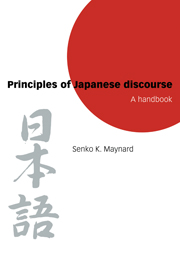Book contents
- Frontmatter
- Contents
- Preface
- Introduction
- To the instructors
- Part I Preliminaries
- Part II Principles
- Part III Selected readings
- 7 Prelude: on reading different genres of contemporary Japanese texts
- 8 Reading Japanese texts
- 9 Tanka and essay R1: from Yotsuba no Essei (“The Four-leaf Essay”) by Machi Tawara
- 10 Narrative R2: Ari to Kirigirisu (“The Ant and the Grasshopper”) from Mirai isoppu (“Future Aesop's Fables”) by Shin'ichi Hoshi
- 11 Newspaper opinion column R3: Kootsuu Anzen Sofuto (“The ‘Soft’-ware for Traffic Safety”) from Asahi Shimbu
- 12 Magazine advertisement R4: Pro-Keds shoes advertisement from Popeye, a young men's magazine 204
- 13 Comic R5: from Kureyon Shinchan
- 14 Newspaper essay: R6: Tensei Jingo from Asahi Shimbun
- 15 Essay R7: Sabaku e no Tabi (“Traveling to the Desert”) by Tetsuroo Morimoto
- Part IV Appendices
- References
- Index
14 - Newspaper essay: R6: Tensei Jingo from Asahi Shimbun
Published online by Cambridge University Press: 08 February 2010
- Frontmatter
- Contents
- Preface
- Introduction
- To the instructors
- Part I Preliminaries
- Part II Principles
- Part III Selected readings
- 7 Prelude: on reading different genres of contemporary Japanese texts
- 8 Reading Japanese texts
- 9 Tanka and essay R1: from Yotsuba no Essei (“The Four-leaf Essay”) by Machi Tawara
- 10 Narrative R2: Ari to Kirigirisu (“The Ant and the Grasshopper”) from Mirai isoppu (“Future Aesop's Fables”) by Shin'ichi Hoshi
- 11 Newspaper opinion column R3: Kootsuu Anzen Sofuto (“The ‘Soft’-ware for Traffic Safety”) from Asahi Shimbu
- 12 Magazine advertisement R4: Pro-Keds shoes advertisement from Popeye, a young men's magazine 204
- 13 Comic R5: from Kureyon Shinchan
- 14 Newspaper essay: R6: Tensei Jingo from Asahi Shimbun
- 15 Essay R7: Sabaku e no Tabi (“Traveling to the Desert”) by Tetsuroo Morimoto
- Part IV Appendices
- References
- Index
Summary
Introduction
Tensei Jingo ([literally] Heaven's Voice, Human Words) is a daily newspaper essay column written by an Asahi Shinbunsha employee. The column offers an (often philosophical) essay related to topical or current social issues, seasonal thoughts or any other items of concern to the writer. Started in 1904, its only absence a five-year period during World War II, this essay column continues to appear today. The Tensei Jingo column appears at the bottom of the first page in the morning Asahi Shimbun, and its English translation appears (since 1957) under the headline of “Vox Populi, Vox Dei” in the same date's Asahi Evening News. The title of the column originates in a Chinese saying: There is a voice in the heavens and the voice is heard through the people. This column has been written by a number of essayists and/or commentators, some of whom have become popular with a substantial number of “fans” among newspaper subscribers.
Collections of Tensei Jingo are regularly published. Japanese collections appear in two volumes per year, published by Asahi Shinbunsha, and the Japanese-with-English-translation version appears in four volumes per year, published by Hara Shoboo in Tokyo.
Pre-reading tasks
When you are in a pensive mood, do different seasons of the year make you ponder different things? What do you think when the fall arrives? When you see falling leaves? In the form of a short essay, write a few sentences in Japanese about your thoughts when you sense the arrival of the fall.
Think of five Japanese words associated with the fall season. Connect them in terms of cohesive relations and develop a Japanese text relevant to these relations.
- Type
- Chapter
- Information
- Principles of Japanese DiscourseA Handbook, pp. 220 - 231Publisher: Cambridge University PressPrint publication year: 1998
- 1
- Cited by



